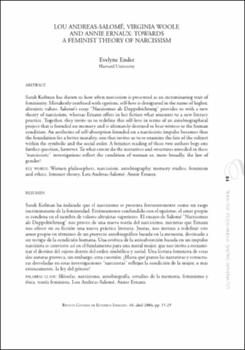Lou Andreas-Salomé, Virginia Woolf, and Annie Ernaux: Towards a Feminist Theory of Narcissism
Author
Ender, EvelyneDate
2004Abstract
Sarah Kofman ha indicado que el narcisismo se presenta frecuentemente como un rasgo
incriminatorio de la femineidad. Erróneamente confundido con el egoísmo, el amor propio
se condena en el nombre de valores altruistas superiores. El ensayo de Salomé “Narzissmus
als Doppelrichtung” nos provee de una nueva teoría del narcisismo, mientras que Ernaux
nos ofrece en su ficción una nueva práctica literaria. Juntas, nos invitan a redefinir este
amor propio en términos de un proyecto autobiográfico basado en la memoria, destinado a
ser testigo de la condición humana. Una estética de la autoabsorción basada en un impulso
narcisista se convierte así en el fundamento para una moral mejor, que nos invita a reexaminar
el destino del sujeto dentro del orden simbólico y social. Una lectura feminista de estas
dos autoras provoca, sin embargo, otra cuestión: ¿Hasta qué punto las narrativas y estructuras
desveladas en estas investigaciones “narcisistas” reflejan la condición de la mujer, o más
extensamente, la ley del género? Sarah Kofman has shown us how often narcissism is presented as an incriminating trait of
femininity. Mistakenly confused with egotism, self-love is denigrated in the name of higher,
altruistic values. Salomé’s essay “Narzissmus als Doppelrichtung” provides us with a new
theory of narcissism, whereas Ernaux offers in her fiction what amounts to a new literary
practice. Together, they invite us to redefine this self-love in terms of an autobiographical
project that is founded on memory and is ultimately destined to bear witness to the human
condition. An aesthetics of self-absorption founded on a narcissistic impulse becomes thus
the foundation for a better morality, one that invites us to re-examine the fate of the subject
within the symbolic and the social order. A feminist reading of these two authors begs one
further question, however. To what extent do the narratives and structures unveiled in these
“narcissistic” investigations reflect the condition of woman or, more broadly, the law of
gender?





